Radio Dustup! CBS Radio Sues Stern for Contract Breach
 Rumors circulating today of a possible CBS Radio lawsuit against former long-time employee Howard Stern became reality today, claiming $500 million in "compensatory and punitive damages for multiple breaches of contract, fraud, unjust enrichment, and misappropriation of CBS Radio's broadcast time. It further seeks damages from Sirius Satellite Radio, Inc. for unfair competition and tortious interference with Stern's CBS contract" as well as Howard Stern's production company One Twelve Inc, his agent Don Buchwald and his agency.
Rumors circulating today of a possible CBS Radio lawsuit against former long-time employee Howard Stern became reality today, claiming $500 million in "compensatory and punitive damages for multiple breaches of contract, fraud, unjust enrichment, and misappropriation of CBS Radio's broadcast time. It further seeks damages from Sirius Satellite Radio, Inc. for unfair competition and tortious interference with Stern's CBS contract" as well as Howard Stern's production company One Twelve Inc, his agent Don Buchwald and his agency.
Looks like yesterday's announced major ratings losses (the first new ratings since Stern left) was all the evidence CBS Radio needed to show damages.
After quietly and respectfully taking it on the chin for the months leading up to Stern's departure in mid-December, looks like CBS is hitting back. Now this story could get very nasty and get tied up in courts for years. CBS filed with the Supreme Court of the State of New York, County of New York. If Anna Nicole Smith can get her 10-year lawsuit to the Federal Supreme Court, maybe this CBS/Stern battle will eventually end up there, too, after both sides exhaust appeal decisions. Among the complaints are that Stern unjustly used CBS Radio (then known as Infinity Broadcasting) airtime during his show to promote Sirius during the remaining 22 months of his contract, which ultimately helped deliver a $200 million mega-bonus Sirius payout to Stern in January for exceeding new subscriber goals once Stern began his new satellite show.
Among the complaints are that Stern unjustly used CBS Radio (then known as Infinity Broadcasting) airtime during his show to promote Sirius during the remaining 22 months of his contract, which ultimately helped deliver a $200 million mega-bonus Sirius payout to Stern in January for exceeding new subscriber goals once Stern began his new satellite show.
Stern has a completely different view. In a press conference late this afternoon, Stern discussed the pending lawsuit just before it was officially delivered. In his words: "I'm offended. I really do think this is a personal vendetta. Les (Moonves, CBS CEO) has had it in for me for a long time. I don't deserve it.".
To read the 43-pages of legal complaints filed by CBS Radio, click here;; or here; or here.
posted by Unknown @ Tuesday, February 28, 2006,
,
![]()
![]()
The New Apple iPod Hi-Fi -- Love it!
 The new Apple Hi-Fi docking stereo unit....just released today. Crystal-clear, audiophile-quality sound in a clean, compact design.
The new Apple Hi-Fi docking stereo unit....just released today. Crystal-clear, audiophile-quality sound in a clean, compact design.
Learn more about iPod Hi-Fi.
posted by Unknown @ Tuesday, February 28, 2006,
,
![]()
![]()
The Goal of Googlizing Old Media Advertising
 Google thinks there is a better way to connect advertising with consumers using traditional media like radio, magazines, newspapers and even TV. And they may have something.
Google thinks there is a better way to connect advertising with consumers using traditional media like radio, magazines, newspapers and even TV. And they may have something.
We all know how annoying it is to see or hear ads that have zero value. I'm not shopping for feminine hygene, ED/Disorder/Big Pharma or AARP products; if I see an ad for them, it's noise (or what is often referred to as "clutter"). It makes me turn the channel, turn it off or tune it out. However, if I see advertising for products I want, need or aspire to have, I'm much more likely to pay attention to it.
Google's AdSense algorithms linking ads to keywords in search as well as metatags contained within visited websites makes advertsing more effective. Can this thinking work for traditional media as their various audiences splinter into more refined niches?
Google hasn't talked much publicly about its TV ambitions, but television is clearly part of the company's long-term strategy to expand its ad kingdom beyond the Internet. Nearly all of Google's $1.4 billion in 2005 earnings came from ad sales. Escalating its advertising strategy is one way to try to keep up the growth.
How Google is attempting to stretch ad sales:
*Print. In April, ads based on Google's auction-style pricing will appear in some 26 magazines, including Martha Stewart Living, Car and Driver and PC World. How it works: Google buys ad space directly from publishers and auctions the space to its clients. Google profits if advertisers offer more than Google paid. The first auction closed Friday. Google will announce the winning bidders, via e-mail, this Friday.
In a newspaper trial, Google is testing small text ads in the business and sports sections of the Chicago Sun-Times. The ads look similar to search ads that appear online -- small, 10-word messages that direct readers to websites and say "Ads by Google" at the top.
*Radio. In January, Google purchased dMarc Broadcasting, which specializes in using computer technology to fill otherwise unsold airtime. DMarc also offers advertisers real-time reports on when and how often an ad has aired on a particular station, something that used to take months to receive and now gets done on nearly 5,000 stations using its automated system to replace unsold inventory with ads at the click of a mouse.
*Television. Google's new online video store (video.google.com) sells reruns of shows from CBS and PBS for viewing on Internet-connected PCs. It hopes to bring its advertiser network to television. TV set-top boxes could become a key tool for Google to learn more about demographics and viewing habits -- and serve up tailored ads.
Cable, satellite, telephone companies -- they are all putting devices in the home that make it possible for Google to find targeted customers and deliver advertising from products people actually want.
Google still has a lot to learn trying to bring their new media ad model to resistent old media operations. If Google pulls it off, it will be a historic shift in the way the traditional media advertising industry conducts its business.
related article here
posted by Unknown @ Tuesday, February 28, 2006,
,
![]()
![]()
A Test For Free FM Replacing Howard Stern: Pushing the Snooze Button Instead of the Ratings Button
 New morning DJ (and former Van Halen splitman) David Lee Roth is on holiday this week (after less than 2 months on the job). Interestingly, it's also the week his first ratings are being released for markets across the country. Sounds like a Bush strategery.
New morning DJ (and former Van Halen splitman) David Lee Roth is on holiday this week (after less than 2 months on the job). Interestingly, it's also the week his first ratings are being released for markets across the country. Sounds like a Bush strategery.
Keep in mind, these are just monthlies and not full quarterly ratings...but they are indicators, especially considering it spotlights Howard Stern's replacements.
On many East Coast CBS Radio station, DLR got Stern's gig while LA-based Man Shower Adam Corolla got Stern's slot for much of the West Coast.
The first batch of Winter 2006 Phase One Arbitrend ratings were released Monday by Arbitron, and, based on the results, New York's 92.3 Free FM (Roth) and LA's 97.1 Free FM (Corolla) both reflect what the public already knows: a sharp decline in ratings post-Stern combined with a relative ho-hum yawn and pressing of the snooze button.
According to radio industry trade newspaper Radio & Records, in New York, Hot Talk WFNY (formerly alternative WXRK) dropped as an entire station to one-third its previous ratings for the month of January among all listeners 12 and older. While Stern was #1 in New York before he left, Roth was only 18th in his first month, despite a huge amount of media curiousity and New York Post gossip about his chances. Among the prime sales demo of 25-54 year olds, Roth's ratings are one-third Stern's. Among 18-34 year olds, ratings are 10% Stern's numbers last year. Again, these numbers are just for one-month, not the more stable full quarterlies, which don't come out till April.
Across the country in Los Angeles, Adam Carolla's show attracted a paltry 0.7 share in January, making KLSX the lowest-rated full-signal commercial FM in the market during the month. Not much Man Show testosterone in those ratings at all.
Keeping some perspective, though, ANYONE replacing Stern more than likely see a drop in ratings. CBS Radio executives think it could take up to two years, and they say they are committed to letting Stern's replacement shows develop and slowly gain listeners.
Of course, the bigger question as the iPodization of America continues, what will morning radio look like in 2 years?
By the way, in my opinion, Free FM/NYC's JV + Elvis (who do middays after Roth in New York, but were historically successful -- and funny -- morning show DJs prior to now) are filling in this week in mornings for Roth while he's away...and they sound so much better, in my opinion. Ironically, despite the big ratings drop, Free FM actually is a better station overall than its preceeding alt rock format K-Rock these last few years in New York, especially with JV + Elvis middays and with the Radio Chick for afternoons. Maybe Roth will study those shows for inspiration.
related story here
posted by Unknown @ Monday, February 27, 2006,
,
![]()
![]()
The Colbert Report Seeks Truthiness in Congress
 At a time when surveys show younger voters turning away from the mainstream media in favor of blogs and late-night television, politicians and their strategists recognize that "The Colbert Report" is a powerful way to reach a swath of Generation Y.
At a time when surveys show younger voters turning away from the mainstream media in favor of blogs and late-night television, politicians and their strategists recognize that "The Colbert Report" is a powerful way to reach a swath of Generation Y.
Congress has long suffered an inferiority complex, a sentiment that has only worsened under President Bush, who has flexed his executive muscles by keeping lawmakers out of the loop on matters ranging from eavesdropping to foreign control of American ports.
So, in an era where there no longer a true mass media, politicians are looking more micro. And "The Colbert Report" has become a hot spot must-visit. Tongue firmly in cheek, Stephen Colbert's "Daily Show" spin-off is on a truthiness quest to interview — or lampoon — all 434 members of the House. (The man who held the 435th seat, the disgraced California Republican Randy Cunningham, "is dead to me," Mr. Colbert declared.)
UPDATE 3/1: Stephen Colbert made special point leading the show tonight to correct the New York Times weekend story, saying they got it wrong. It's not Randy Cunningham ("The Dukester") that "is dead to me"....it's California's 50th district that really "is dead to me" for letting down the Dukester. The 50th is SO dead to Colbert on The Colbert Report, he no longer thinks the 50th exists. He wanted to make sure that correction was made and expects the Times to acknowledge it. Now that is commitment to truthiness.
As he assembles a dupes' gallery, Mr. Colbert is showing a national audience what veteran Congress-watchers already know: politicians are idiots just like us.
At the same time, the show reveals an essential truth about Washington: being humiliated on national television can be better than not being on national television at all.
The rest of the New York Times article here
posted by Unknown @ Monday, February 27, 2006,
,
![]()
![]()
The Latest On How Women and Men Use the Internet
 I'm fascinated with search.
I'm fascinated with search.
As a market researcher, I seek for opportunities based on data detailing consumer behaviours and preferences. As a radio personality, I sought ways to entertain and inform the largest amount of people by viewing pop culture in my own way. As a student, simply learning in a classroom or devouring a book wasn't enough; I needed to spend extra time asking questions and seeking answers to my complex questions with teachers and professors over coffee for hours on end. Reading about Rome or Paris or Bogota or Munich or Santiago's history wasn't enough; I needed to go there and experience it for myself.
For me, search is a deep, exploratory thing. And I love it.
I've always been labeled as a curious soul, someone always asking questions, trying to connect dots, to find meaning in data, observations, history, scenarios or concepts. Of course, that's not an exclusive label. We are all searching, consciously or unconsciously. It's why a song like U2's "I Still Haven't Found What I'm Looking For" resonates so deeply with people across the globe, regardless of culture or language.
Search is mankind's fuel for its holy grail: true knowledge. It is search that drives us for understanding and for innovation. Yet, we are not all the same when it comes to search. Especially on-line. A recent PEW Internet study exploring how men and women use the Internet points out some interesting differences between the sexes. It's more than just men searching for porn and women searching for shoe porn. Or is it? This study caught my attention because it's fascinating to see how millions of years of conditioning and the differences in our respective genetic wiring affect our use of new technology. The PEW study echoed many stereotypes we think exist in the other gender off-line.
A recent PEW Internet study exploring how men and women use the Internet points out some interesting differences between the sexes. It's more than just men searching for porn and women searching for shoe porn. Or is it? This study caught my attention because it's fascinating to see how millions of years of conditioning and the differences in our respective genetic wiring affect our use of new technology. The PEW study echoed many stereotypes we think exist in the other gender off-line.
Men like the experiences the Internet offers while women like the new communities they form. In essence, women are more "chatty" (heavier use of IMs, two-or-more web cam conversations for the tech savvy, much more detailed emails exchanges and attracted to web portal sharing communities) while men are more blunt and one-way (shorter to-the-point online posts and emails, quick [if any] IMs and more one-way info gathering), preferring to get what they want as fast as possible, quickly moving on the next task. Women will linger longer while searching; men tend to focus on the top results, get it, and move on.
Sounds like a typical exercise in shopping at a mall.
PEW study here
posted by Unknown @ Sunday, February 26, 2006,
,
![]()
![]()
How much content from search engine results are sponsored vs organic?
 Want to know how much content on a search engine is sponsored vs. organic? So did this academic from Syracuse University in a study published in the Journal of the American Society for Information Science and Technology (2005).
Want to know how much content on a search engine is sponsored vs. organic? So did this academic from Syracuse University in a study published in the Journal of the American Society for Information Science and Technology (2005).
His goal for the study was to gain a better understanding of the amount and type of advertising presented to search tool users compared to natural organic information.
Among his thoughts, he thinks:Searchers should add an additional synonym to their queries. This will greatly reduce the number of sponsored links and serve to help the search tool provide better results.
Searchers need to be aware that many of the results displayed on the first screen of results will be sponsored, and they need to scroll down and see the entire page (and even to continue on to other pages of results) before abandoning a search term.
Research pdf report here
posted by Unknown @ Saturday, February 25, 2006,
,
![]()
![]()
What is Podcasting? Your Friendly Neighborhood Ninja Explains...
 Video Podcasting is still misunderstood quite a bit. Who does them? Why watch them? What are these fools thinking anyway when they make them?
Video Podcasting is still misunderstood quite a bit. Who does them? Why watch them? What are these fools thinking anyway when they make them?
YouTube.com -- which launched in December -- has quickly become a prime location on the Net to view cutting edge independent videos and video podcasts.
(note: another good new grassroots viral video location is the iFilm/VH1 VSpot of web junk; VH1 even makes a weekly show out of the Top 20 video web "finds")
To help you better understand podcasting, why not have a ninja teach you? Somebody thought it was a good idea. Here Mr. Ninja explains podcasting even 12 year olds would understand. Well, especially 12 year olds would understand. Is this a new media superstar in the making?
YouTube Ninja podcast here
posted by Unknown @ Saturday, February 25, 2006,
,
![]()
![]()
Say Goodbye to 8am Classes with iTunes U
 Where was the iPod when I really needed it? As a college student! With my iPod podcasting the day's lecture which I downloaded from the campus secure server, I could have "gone to class" on my time when and where I wanted...instead of some schedule decided by the Registrar's office or, heaven forbid, my professor. Rodney Dangerfield surely would have approved when he went "back to school".
Where was the iPod when I really needed it? As a college student! With my iPod podcasting the day's lecture which I downloaded from the campus secure server, I could have "gone to class" on my time when and where I wanted...instead of some schedule decided by the Registrar's office or, heaven forbid, my professor. Rodney Dangerfield surely would have approved when he went "back to school".
Not my reality then...but it is for coeds todays. Thanks to Apple's new testing concept called "iTunes U", college students access course lectures and other educational materials through iTunes. Apple has been testing the program with six schools, including Stanford University and The University of Missouri, which had offered podcasts of its lectures through its school network before becoming an Apple pilot school. Each school is able to decide whether to make its materials available to certain groups or the general public.
As one university professor said, "iTunes is the interface most of our students are already familiar with." Glad they're paying attention now...but they sure didn't like our walkman's in class in the '80s! Hmmm, time to get my MBA program to podcast. First, though, let me get back to watching my Van Halen "Hot For Teacher" video on my iPod, back when David Lee Roth actually mattered...
Hmmm, time to get my MBA program to podcast. First, though, let me get back to watching my Van Halen "Hot For Teacher" video on my iPod, back when David Lee Roth actually mattered...
related story
posted by Unknown @ Saturday, February 25, 2006,
,
![]()
![]()
Official from Apple: One Billion Legal Downloads
 Wow, one BILLION iTune downloads. Apple just announced they reached that amount of total downloads today. The winning song? Coldplay's "Speed of Sound" from the "X&Y" album, downloaded by Alex Ostrovsky from West Bloomfield, Michigan. Remember that for future Trivia Pursuit editions.
Wow, one BILLION iTune downloads. Apple just announced they reached that amount of total downloads today. The winning song? Coldplay's "Speed of Sound" from the "X&Y" album, downloaded by Alex Ostrovsky from West Bloomfield, Michigan. Remember that for future Trivia Pursuit editions.
Coldplay? Isn't it just a little ironic lead singer Chris Martin's baby is named Apple? Did he and Gwyneth know something we didn't?
Still...a billion legal downloads from around the world in just 3 years. That is astounding.
The iTunes Music Store now features a selection of over 3,500 music videos, Pixar and Disney short films, a variety of hit TV shows, 35,000 podcasts, 16,000 audiobooks and more than two million songs from the major music companies and independent record labels.
According to Apple, the iTunes Music Store is also the world’s most popular video download store with more than 15 million videos purchased and downloaded.
Read the press release here.
posted by Unknown @ Thursday, February 23, 2006,
,
![]()
![]()
Joint Communications Obtains #1 Organic Search Rank for Media Trend Watching
 This Jointblog aims to be the central place for Media Trend Watching on the web. A place for learning where we are learning, too. In essence, we are brand building online...and it seems you are agreeing with our goal. Many of our recent posts have focused on media design and the importance of organic search optimization (SEO) in order to become successful in the "Long Tail" of web search rankings.
This Jointblog aims to be the central place for Media Trend Watching on the web. A place for learning where we are learning, too. In essence, we are brand building online...and it seems you are agreeing with our goal. Many of our recent posts have focused on media design and the importance of organic search optimization (SEO) in order to become successful in the "Long Tail" of web search rankings.
All with ZERO marketing dollars and ZERO purchasing of keywords or sponsored links.
Last December, we achieved organic search optimizing success for the search term of our company Joint Communications -- a previously generic term on the web we converted through JointCommunications.com and the Jointblog to become the #1 search rank out of nearly 65 million results (see article).
Well, we achieved another SEO success...this time for our mission: Media Trend Watching. #1 search rankings out of millions of results from Google, MSN, Clusty, Altavista, Lycos and AOL and #2 with Yahoo! We thank you. Keep coming back, linking to us and spreading the word to your friends! We are glad to be a source for your own media trend watching. And we're determined to get that #1 ranking with Yahoo!, too.
If you have any stories or points of view, feel free to post your comments or email here so we can post for you.
In the spirit of media trend watching,
Chris Kennedy
View below more screenshots (note the separation between paid search results and organic search results):




posted by Unknown @ Thursday, February 23, 2006,
,
![]()
![]()
The Snarkier, The Better: The Media Trend of Blogging Style
 BoingBoing is the Park Place of Blogopoly, better known as the Blogosphere...the blog with the most links pointing to it (more than 12,000 sites and counting). Fark.com (my current favorite) might be Marvin Gardens (always a useful trade).
BoingBoing is the Park Place of Blogopoly, better known as the Blogosphere...the blog with the most links pointing to it (more than 12,000 sites and counting). Fark.com (my current favorite) might be Marvin Gardens (always a useful trade).
It's been more than 12 years since the first "weblog" appeared on the World Wide Web (as the Internet was then known) and 6 years since Blogger.com offered the world's first free blogging service complete with templates and easy use. In 2004, the word "blog" was named new "word of the year".
In the world of blogs, the sites with the most links pointing to it win...but that can change in a blink of a new blog.
Today, some 15,000 to 20,000 new blogs are started up every day (although most stop being active within a few days). As mentioned in a Jointblog post earlier this week ("Blog Failure Rates"), there must be an opportunity to recycle these dead blogs. Some blogs are witty, some are geeky, some are newsy, some are gossipy.
What it is that keeps a blog active and, even better, successful? New York magazine has a terrific cover article about blogging last week and should be considered a must-read for the moment (don't worry, the success stories will change once again within six months...that's how fast blogging is evolving).
Great blogs attracts high-quality readership because it targets a valuable niche theme (thank you, Jointbloggers!)...small readerships or large ones, both are valuable.
If there are three rules to remember in creating and maintaining a successful blog, remember these:
1) Consistently and actively publish and post. Once you start, don't stop. Keep feeding the blogosphere. There are so many people out there in blogland as well as in mainstream media (MSM) searching for CNT (cool new things). Call them cool hunters or whatever. Think of any ecosystem, say, the ocean. The biggest fish are search for the smaller fish which are searching for the smallest fish, which are feeding on the plankton and so on. You never know who is going to encounter your blog. Just keep at it and stay fresh.
2) Understand Search Engine Optimization (SEO). It's not just about the "look" of the site, the content, meta tags, keywords, inside and outside linking, the frequency of publishing -- they all matter. While the "look" of the site may help surfers stop and blink accept your site once, ultimately it is what you have to offer the reader that matters. Is it hard-to-find links to gossipy news? Does it master a certain perspective? Is its "theme" clearly understood? Is it strong enough that people might want to subscribe and/or link to your site because it contains something special and cool? Whatever it is, it needs to have all the search engine pointers in place. Sites need to be submitted to search engines. Whatever you can go to start spreading "word of mouth" recommendations to check out your blog, do it, keeping doing it and never stop doing it.
3) Find your style and stay true to it. The most popular blogs offer a unique style and hyper-focus on a particular niche. Gadgets, Sex, Tech, Gossip, Celebrity culture, Local scene, Pop Culture, Music, TV shows, Politics...in essence, any of the drivers for New Entertainment Culture. Spend time studying the most popular blogs (the Jointblog recommends any of the links posted in our link section to the right). And then make your blog your own thing.
Although blogs successes like the still-new Huffington Report (launched just last May and now the #4 blog in the world based on page views) indicate more acceptance of blogs as mainstream media, the blogosphere is still an underground, wild wild west land grab. Snarky content seems to be most viral, whether is it iFilm or JibJab spoof videos on Brokeback Mountain (for Star Wars: The Empire Brokeback and other top viral videos, click here) or slams on politics or celebrities. How did the mainstream media first get the images of Britney Spears driving with her baby on her lap? From a blog.
Snarky commentary (Fark is the king of new snark) -- especially on pop culture or even skewering popular mainstream media or the popular blogs themselves -- also tends to be popular for viral distribution. Gawker.com, you've been sucking lately, by the way...what's going there, you all on Spring break?
Ultimately, blogging may be the edgiest medium of the moment and a pre-cursor for emerging trends. It IS the street...right-now grass roots stuff. Yes, "content is king" (as the overused and misunderstood dictum states). However, that content still has be first found and always be fresh. Readers want fresh thinking, fresh perspective. It's all about idea sharing. And that is the quickest way modern innovation happens.
If you can do that consistently, you just might be ready to make your blog advertising-ready.
More about that subject in the days ahead...
posted by Unknown @ Thursday, February 23, 2006,
,
![]()
![]()
A New Way To Create Buzz And Help Customers Discover You
 So far, podcasting is relatively an underground trend in development. Sure, they are available on iTunes and they have their early adoptor fans. None of the podcasters, so far, have really captured mainstream attention. There may be one podcast about to change that.
So far, podcasting is relatively an underground trend in development. Sure, they are available on iTunes and they have their early adoptor fans. None of the podcasters, so far, have really captured mainstream attention. There may be one podcast about to change that.
It's called Buzz-O-Phone, a service that collects opinions "about a product, service, brand or company? You know, something you either really, really love or really, really hate?", according to the website. Basically, it's a centalized oh-wow-this-is-cool or a bitching center that converts the wows and bitching into a podcast for the world to hear, download and pass along to friends. Great for word of mouth marketing...but potentially a major headache for marketers attempting to massage, spin or control their message campaigns.
The service was created as a means to explore word of mouth. While some brands may initially suffer from pinheads who have nothing better to do in life than complain, it won't be long before brands in the know begin to game the system seeding it with oh-so-glowing commentary on their brand or product.
Attention to marketers: view it as an early way to create positive buzz for your product.
posted by Unknown @ Tuesday, February 21, 2006,
,
![]()
![]()
Product Placement Gains With Video Games
 According to USA Today, product placements in video game software have been around since the 1980s. Back then, Sega was placing banners advertising Marlboro in its auto-racing arcade games. Apparently, Sega's still onboard with product placement. In Sega's Super Monkey Ball, the bananas sport Dole Food Company stickers. Surprisingly, this kind of product integration isn't about the cash.
According to USA Today, product placements in video game software have been around since the 1980s. Back then, Sega was placing banners advertising Marlboro in its auto-racing arcade games. Apparently, Sega's still onboard with product placement. In Sega's Super Monkey Ball, the bananas sport Dole Food Company stickers. Surprisingly, this kind of product integration isn't about the cash.
Just as product placement in movies promotes credibility and realism in the movie, it does the same thing in the video game -- making the "environment" of the game more lifelike.
In the screenshot picture above taken from Tony Hawk's Underground 2 video game, this Jeep is a current example of product placement. It even plays music from a custom radio station which includes custom radio ads. In a way, video games are a modern version of exposing new fashions, trends and music as college radio was back in the '80s.
The Feb. 27 edition of Business Week notes that the video game business is already bigger than the movie business, with $10 billion in sales last year. Forrester Research predicts that ad spending on brand placement in games will zoon from $75 million last year to "as much as $1 billion by 2010." That's something for cable ad staffs to monitor. "This is a new world of interactivity that puts gaming on the same plane with advertisers as cable TV," says Tim Harris, who heads the gaming unit of media agency Starcom MediaVest Group.
click here for BusinessWeek article
posted by Unknown @ Tuesday, February 21, 2006,
,
![]()
![]()
Smart Phones for New Ratings Collection
 The digtal world continues to converge around the cellphone. MobileESPN, videoporn, radio broadcastings and podcasts...it's all centralizing onto the cellphone, a place where mp3s, day planners, emails, web surfing and games have already been accepted. The advertising world is adapting how it figures out usage ratings so that it can sell better. It looks like a new SmartPhone could be one of the answers.
The digtal world continues to converge around the cellphone. MobileESPN, videoporn, radio broadcastings and podcasts...it's all centralizing onto the cellphone, a place where mp3s, day planners, emails, web surfing and games have already been accepted. The advertising world is adapting how it figures out usage ratings so that it can sell better. It looks like a new SmartPhone could be one of the answers.
One of the benefits of strategic consulting is the privilege to explore innovative thinking and help clients think outside of the proverbial box. One such conversation I had took place in September 2004 with Arbitron's personal people meter (PPM) lead maven (I'll keep him unnamed here since it was a private conversation), who later became a leader for the Arbitron/Nielsen collaboration called the "Apollo Project".
This project is designed to take ratings systems out of the dinosaur analog/diarykeeping days and into today's digital reality to measure the impact and reach of all forms of modern advertising. Radio, TV, Internet and more.
At the time (and still today), Arbitron had been trying to convert media and advertising companies to accept the PPM. Test have been conducted in select markets. However, many companies have balked at the new technology, fearing dramatically different ratings measurements rather than the ratings system they have traditionally sold for decades.
In my casual conversation with Arbitron, I shared my thoughts and recommendations. Among them:
1) Consider this transition as a "system software platform change", such as Windows does when it goes from 98 to XP to the upcoming Vista or when Apple goes from OS 9 to OS. It makes the old system relatively obsolete and forces new application use. In essence, it becomes a new gold standard. PPM (or Apollo) needs to become a new gold standard.
2) Drop the PPM gadget development concept and think cellphones and SIM card development. Instead of building new gadgets (in which Arbitron had zero history), shift instead to customizing cellphones through SIM cards and/or similar thinking. With all the modern gadgets people carry around (cells, blackberries/Treos, pagers, iPods, etc.), no one wants to carry around yet another gadget designed only to measure ratings which require special uploading cradles to send the data home to Arbitron or Nielsen. Certainly not for $5.
It seems Arbitron didn't heed my recommendations.
A month later (October 2004), the Apollo Project partnership between Arbitron and Nielsen was announced. Basically, the announcement did not generate much excitement at all. In fact, many vocal opponents heavily criticized it. And it still hasn't been embraced by the industry. All it seemed to be was an extension of the reviled PPM device.
About 9 months later (Spring 2005), Clear Channel announced an idea competition, hoping to find a better alternative than the PPM or the "Apollo Project". 34 firms submitted their ideas and by December 2005, Clear Channel said they had narrowed their finalists to just a few companies. The consistent theme: the new digital measuring device would be handled by common consumer cellphones adapted for ratings collection.
Glad someone agreed.
Think about it: what other other devices is carried by people gladly everywhere they go? The only other gadget that might be kept with a person more might be a wristwatch. But creating adaptive software technology for a watch is much more difficult. For a cellphone, it is realtively easy.
So today, one of the seven Clear Channel competition finalists (a partnership between IPSOS and Media Audit) announced that their new technology for collecting ratings data has passed a major test, being validated by the official British ratings service (called RAJAR). US testing of the technology begins in the next few months.
As you'd imagine, Arbitron/Nielsen want to protect their technology (and their investment). They made their bet with PPMs a long time ago. What do they think of this concept from IPSOS/Media Audit? According to a quote in MediaWeek.com, John Snyder, VP of PPM sales for Arbitron says “Smart phones won’t just monitor radio listening, they will help a survey respondent replace radio listening with a long list of alternative audio media. As a result, any smart phone ratings sytem will artificially inflate the number of ‘early adopters’ in a radio ratings survey. The results could be devastating for radio. It would be like Arbitron giving a free iPod to every one of our diarykeepers.”
This battle will be interesting to watch in 2006.
If this Clear Channel competition can create something truly innovative, forcing the rating companies to change gears away from PPM (and all the millions of $$$ they have spent in development) and toward this new "SmartPhone" concept, that would be a major accomplishment. It would show Clear Channel's influence is driven not just by size but also by its ability to create innovation.
Now that would be something.
related MediaWeek article here
posted by Unknown @ Tuesday, February 21, 2006,
,
![]()
![]()
Blog Failure Rates
 A major highlight from Technorati's State of the Blogosphere report is the estimate that 75,000 new blogs, or approximately one blog every second, come online every day.
A major highlight from Technorati's State of the Blogosphere report is the estimate that 75,000 new blogs, or approximately one blog every second, come online every day.
And yet, only HALF are still kept current three months later. 75,000 times 90 days equals 6,750,000 new blogs every quarter...3,375,000 that fail and become dead, which creates a lot of deadspace debris. How do these get cleaned up? Do they get tossed in a blog dump? Do they ever get deleted? Blogger.com's rules say that if you find a dead blog and desire its subdomain name, you need to contact the registered user directly and request the transfer. Remember, registering for a blog domain name on places like blogger or typeset are free. The chances of you getting it (and getting it released without payment) are minimally.
If Technorati's estimates are indeed accurate, it sounds like someone needs to set up a solid blog recycling program ASAP. Opportunity?
posted by Unknown @ Monday, February 20, 2006,
,
![]()
![]()
State of the Blogosphere, Part 2
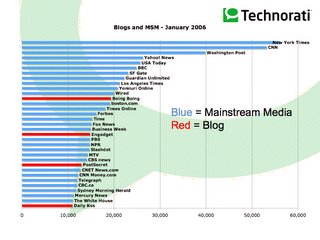 Part 2 of Technorati's State of the Blogosphere reveals how mainstream media (MSM) has figured out how to use blogging successfully. The top blog sites are mainly from news organizations, such as The New York Times, CNN, Washington Post, USA Today and the BBC. However, new media is represented well, with Yahoo! News, BoingBoing, Engadget, PostSecret, Daily Kos and slashdot showing up.
Part 2 of Technorati's State of the Blogosphere reveals how mainstream media (MSM) has figured out how to use blogging successfully. The top blog sites are mainly from news organizations, such as The New York Times, CNN, Washington Post, USA Today and the BBC. However, new media is represented well, with Yahoo! News, BoingBoing, Engadget, PostSecret, Daily Kos and slashdot showing up.
Among the other findings regarding today's blogsophere from Technorati's David Sifry:• Blogging and Mainstream Media continue to share attention in blogger's and reader's minds, but bloggers are climbing higher of the attention curve.
• Blogs take a more and more significant position as the economics of the mainstream publishing models make it cost prohibitive.
• Bloggers are changing the economics of the trade magazine space, with strong entries covering WiFi, Gadgets, Internet, Photography, Music.
• There is a network effect in the Technorati Top 100 blogs, with a tendency to remain highly linked if the blogger continues to post regularly and with quality content (note: we follow this thinking at the Jointblog).
• The "Magic Middle" (155,000 or so weblogs that have garnered between 20 and 1,000 inbound links) is a realm of topical authority and significant posting and conversation within the blogosphere.
State of the Blogsphere, Part One, click here
State of the Blogsphere, Part Two, click here
posted by Unknown @ Monday, February 20, 2006,
,
![]()
![]()
State of the Blogosphere 2006
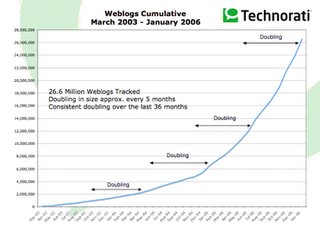 Technorati compiles a periodic State of the Blogosphere report, the latest reporting that the blogosphere continues to grow at a rapid pace. Technorati now tracks 27.2 million blogs -- 60 times more than three years ago -- and that the number of blogs doubles about every 5.5 months. 2.7 million blogs are updated at least weekly.
Technorati compiles a periodic State of the Blogosphere report, the latest reporting that the blogosphere continues to grow at a rapid pace. Technorati now tracks 27.2 million blogs -- 60 times more than three years ago -- and that the number of blogs doubles about every 5.5 months. 2.7 million blogs are updated at least weekly.
As of last month, Technorati estimates that 75,000 new blogs, or approximately one blog every second, come online every day
Here's the kicker: Of all these blogs, HALF are still kept current three months later. That's a lot of failures or bloggers getting bored.
Technorati currently tracks 1.2 million blog posts per day, or 50,000 posts each hour. The frequency of postings fluctuates, largely based on current events that bloggers write about, though the overall trend is upward. In 2005, posts spiked on the death of Terry Schiavo, the revelation of the identity of "Deep Throat," the retirement of Justice Sandra Day O'Connor, the London bombings, Hurricane Katrina, and the hearings for the confirmation of Samuel Alito to the Supreme Court.
posted by Unknown @ Monday, February 20, 2006,
,
![]()
![]()
A New Ad Network for Podcasting: The Search for $$$
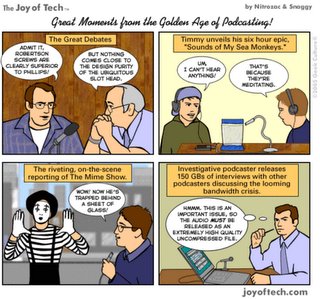 Podcasting is still a very new entertainment option. Podcast Alley -- one of the web top places to find and download podcasts -- lists almost 15,000 available podcasts. iTunes has a similar amount. According to Forrester Research, podcasting will see significant growth by 2010, reaching 12.3 million households, as portable player adoption climbs and broadband reaches 62 percent of households. Already, 42 million iPods have been sold and 29% of iPod users have downloaded podcasts, according to the Pew Internet and American Life Project.
Podcasting is still a very new entertainment option. Podcast Alley -- one of the web top places to find and download podcasts -- lists almost 15,000 available podcasts. iTunes has a similar amount. According to Forrester Research, podcasting will see significant growth by 2010, reaching 12.3 million households, as portable player adoption climbs and broadband reaches 62 percent of households. Already, 42 million iPods have been sold and 29% of iPod users have downloaded podcasts, according to the Pew Internet and American Life Project.
Figuring out a new advertising value with podcasts is still a question not answered. One company is trying: Podbridge. According to their press release:"Podbridge... unveiled a new ad network aimed at turning the fast-growing podcasting phenomenon into a viable and profitable business. The new service... includes the unique ability to track the number of listens, place ads by demographic and location, rotate multiple ads, and manage campaign budgets. Podbridge is currently building a network of major media companies whose podcasts will utilize its technology. Podbridge has already secured partnerships with content providers such as BBC, Clear Channel radio stations KNEW and KQKE, Military.com, and Sports Byline USA."
Some media agency network will need to formed in order to create performance capability, including reach and effectivessness as well as airplay accountability. Ultimately, once a successful model is created, one of the bigger established agencies surely will scoop it up...
Read the entire Press Release here.
posted by Unknown @ Monday, February 20, 2006,
,
![]()
![]()
Skype Calls Are Encryted: How To Stop Those Pesky Eavesdropping Problems
 With all the current talk about governmental eavesdropping, Skype might be the solution. Big Brother fears might be the headache convincing consumer's to try the free service, making the controversial practice of eavesdropping a thing of the past and a problem of "old media".
With all the current talk about governmental eavesdropping, Skype might be the solution. Big Brother fears might be the headache convincing consumer's to try the free service, making the controversial practice of eavesdropping a thing of the past and a problem of "old media".
According to an Associated Press article from technology writer Peter Svensson, Skype (eBay's Internet calling service purchased for megadollars last summer, which is enabled for both Windows and Mac) provides encrypted free voice calls and instant messaging between users. "Encrypted" means lots of complicated mathematical operations make it nearly impossible to snoop, though Skype says that's debatable. If that's true, ANYONE (including criminals, terrorists and psychos) are just as anonymous using Skype as the rest of us law-abiding citizens who want to call their family or friends.
I've used Skype and it really is simple yet amazing. Skype calls move through the Web encrypted with "keys," which are very long numbers -- 256 bits long to be exact, which is double the length of those used by credit card companies. In theory, that means Skype's 256-bit keys would take trillions of times longer to crack than credit card companies' 128-bit keys, which are already considered practically impossible to break. But Skype may not be quite so secure as it seems, according to security experts, because the company has yet to open its technology to review. Even so, a weak encryption system is still extremely difficult to break, and, "would {likely} stymie the kind of broad eavesdropping that the National Security Agency is reputed to be performing," said the Associated Press.
If you like new tech advances, this is a good new article about Net-based telephony.
posted by Unknown @ Friday, February 17, 2006,
,
![]()
![]()
Bad Day for XM Yesterday; Meanwhile, Over At Sirius...
 Not a good day for XM yesterday, with stock price drops following the sudden and vocal departure of a key Board member expressing concern about the company's direction. What, he didn't like the Oprah announcement?
Not a good day for XM yesterday, with stock price drops following the sudden and vocal departure of a key Board member expressing concern about the company's direction. What, he didn't like the Oprah announcement?
Meanwhile, Sirius -- the home of Howard Stern -- has its own issues.
In their own SEC filing today, Sirius easily reported at first a lot of good news front and center:"SIRIUS SATELLITE RADIO REPORTS RECORD SUBSCRIBER GROWTH AND REVENUE FOR FOURTH QUARTER AND FULL-YEAR 2005"
"Subscribers Increased 190% to Over 3.3 Million at Year-End 2005"
"Satellite Radio Market Share Leader For Fourth Quarter 2005"
"2005 Revenue Grew 262% to Over $242 Million"
"More Than 6 Million Subscribers Expected by Year-End 2006"
There -- but buried -- under the positive headlines in the regulation-required letter is the fact company net losses substantially increased from $262 million to $311.4 million in the final quarter of 2005 (compared to the same period a year ago), blamed on higher costs for acquiring subscribers. Losses widened despite the tripling of revenue to $80 million in the 4th quarter, thanks to Howard Stern.
Which story do you think the Street noticed most?
Both new media companies are still expanding and trying to solidify the consumer value. Both are spending on marketing, top-of-the-line studios and equipment, distribution and consumer/receiver products and high-priced content.
It goes to show you that both XM and Sirius are still on a media/marketing rollercoaster. Up days and down days. And that there is still a lot of distance and time to build long-lasting growth. Yes, the total subscriber count is up to near 10 million, collectively. Estimates predict a total of between 35 and 50 million by 2010.
Long way to go and a lot of bills to pay to keep the lights on between now and then.
SEC filing
posted by Unknown @ Friday, February 17, 2006,
,
![]()
![]()
XM Radio Board of Directors: Exit, Stage Left
 "Heavens To Murgatroid!" (thank you, Snagglepuss)...how often do you ever hear of a Board Director parting ways from a sexy upstart new media company...stating reasons for the departure such as being "troubled about the current direction of the company" and having to express concern or dissent in a "vociferous manner", believing a "significant chance of a crisis (is) on the horizon"?
"Heavens To Murgatroid!" (thank you, Snagglepuss)...how often do you ever hear of a Board Director parting ways from a sexy upstart new media company...stating reasons for the departure such as being "troubled about the current direction of the company" and having to express concern or dissent in a "vociferous manner", believing a "significant chance of a crisis (is) on the horizon"?
Yikes! Exit, stage left...
What does that mean for XM?
SEC filings often offer amazing insight. Here is one from just-resigned 5-year board member Pierce Roberts to XM Satellite Radio Chairman of the Board Gary M. Parsons:
Gary M. Parsons
Chairman of the Board
XM Satellite Radio Holdings Inc.
1500 Eckington Place
Washington, DC 20002
Dear Gary:
It has been my pleasure to serve on the Board of Directors of XM for more than 5 years. The company has achieved many notable successes and overcome numerous seemingly-insurmountable obstacles during this period. It has been great fun to have a minor role in helping you, Hugh and the XM team as the company has grown from its founding concept to become a major firm with rapidly growing numbers of subscribers. There is much in which to be pleased.
That said, I have been troubled about the current direction of the company and do not believe that it is in the best interest of the company's shareholders. For some time I have made my analyses and observations known in an increasingly vociferous manner to the Board and a number of senior managers of the Company. I am not having any useful effect and I care too much and believe in my own views too much to just "go along".
Given current course and speed there is, in my view, a significant chance of a crisis on the horizon. Even absent a crisis, I believe that XM will inevitably serve its shareholders poorly without major changes now. It is clear to me that I cannot be part of the solution and I will not be part of the problem.
Therefore, after a lot of thought and with a great deal of sadness, I tender my resignation to be effective immediately. Thanks and best wishes to the entire XM family.
Sincerely,
/s/ Pierce J. Roberts, Jr.
Pierce J. Roberts, Jr.
Why do so few boardmembers resign over differences with management? Usually when board members leave, it's done quietly so as to not disrupt Wall Street. Plus, of course, most board members are often hand-picked appointees so the agreement potential is higher. So rudeness is normally avoided.
But a "vociferous" (to use Roberts' word above) difference within the ranks of XM's Board? What does that mean for XM in the coming months?
SEC filing
posted by Unknown @ Thursday, February 16, 2006,
,
![]()
![]()
Google: The Shark Has Just Jumped?
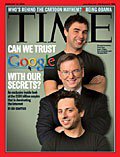 First, Google censoring China search results. Then a BusinessWeek article. And a shredding from Barron's leading to stock price drop. Now the cover of Time, which I just got done reading this evening. In it, Time went searching for the real Google. What did they find? Larry and Sergey playing with Legos while workers are getting free massages and haircuts and Eric wondering why there is a London telephone booth in a hallway with no phone in it. All nice imagery to have when you're trying to measure cool work environments...if you can get it and have a market cap of $100 billion, $6.1 billion in revenues and $1.5 billion in profit.
First, Google censoring China search results. Then a BusinessWeek article. And a shredding from Barron's leading to stock price drop. Now the cover of Time, which I just got done reading this evening. In it, Time went searching for the real Google. What did they find? Larry and Sergey playing with Legos while workers are getting free massages and haircuts and Eric wondering why there is a London telephone booth in a hallway with no phone in it. All nice imagery to have when you're trying to measure cool work environments...if you can get it and have a market cap of $100 billion, $6.1 billion in revenues and $1.5 billion in profit.
Let's face it, Google's success is a big deal to new media watchers and users. And when Google makes a rare misstep, it gets noticed. For nearly all of Google's amazing run, the news and buzz has nearly always been good.
But, you know the movement has peaked and the shark has jumped when the princes of "Do No Evil" who've spent 8 years trying to stay in the garage and out of the spotlight now are spending more time as coverboys. Is that time now? According to Wikipedia, here's the definition of "jumping the shark"
According to Wikipedia, here's the definition of "jumping the shark""A metaphor used by US television critics and fans since the 1990s to denote the moment when a television series is (in retrospect) deemed to have passed its peak. Once a show has "jumped the shark," fans sense a noticeable decline in quality or feel the show has undergone too many changes to retain its original charm...It alludes to a goofy scene in the TV series Happy Days when its popular character, Fonzie, is on water skis and literally jumps over a shark...The term has also evolved to describe other areas of pop culture, including film series, music or acting celebrities, or authors for whom a drastic change was seen as the beginning of the end."
Mark it in your iCals and look back at Google a year or two from this week and see if Google still has the lock on searching. Sure, Happy Days stayed popular for several more years; it just wasn't the same.
My guess is Google's effort to expand so rapidly into new territory (doubling their workforce in the last year) will suddenly create a cumbersome management structure unwieldy for effectiveness. Google's past strength has been market agility and below-radar savviness. Doing the covers means that Larry and Sergey are doing exactly what they fine employees for doing -- stock ticker watching. That was the concern when they Dutch Auctioned their IPO -- when would they put Wall Street ahead of the end user? Is that now?
Of course, I could be wrong...Google is still my most used webpage and search tool; it's even my homepage when I launch Firefox and it is the search tool here on the Jointblog. I love Google and what it does. I just don't want it spoiled or ruined; I want my user experience to remain great.
This recent series of articles and expansion controversies make it appear like this may be one of those watermark points for something massively successful in pop culture suddenly going against its coolness rep. Is it possible Google can keep their position growing and figure out new advertising leadership positions beyond search and smart linking? What's their next move?
And, more importantly, if someone typed in a Google search for "Google jumps the shark", will Google actually show it in the results? At the time of this posting, only 111 results show up. So far.
TIME.com article
posted by Unknown @ Wednesday, February 15, 2006,
,
![]()
![]()
Blogs to Riches - Secrets for Blogging Success
 If you like the Jointblog, we encourage you to link to us. This week's New York magazine does an excellent job explaining why.
If you like the Jointblog, we encourage you to link to us. This week's New York magazine does an excellent job explaining why.
In it, New York looks at the Web's most popular blogs, how they got there, how they stay there, and how you, too, could possibly start your own A-list blog. Blogging, like Google's Page Rank system, is all about links -- the more sites that link to you, the more popular the blog, inevitably.
For example, Boing Boing, a site for tech community folks (which we link to here on the Jointblog), is the Web's most popular blog, according to blog measuring firm Technorati, with nearly 20,000 links. Once you hit that kind of popularity, the traffic will keep coming -- and keep coming back, too, as long as you post as often as you possibly can. A-list blogs also tend to link to each other, ensuring that blog users keep going round and round the same community of sites.
For advertisers, of course, the whole lure of blogs is that they're cheaper than regular newspapers, TV and media Web sites, and often, they serve up tightly focused niche audiences, which advertisers love. (Note: the Jointblog remains commercial-free). Blogs are also social connectors, because if one starts a conversation about, say, an ad, others will scoop it up quickly. And soon, the message is out to a vast network of tightly focused niche groups.
This blog boom just may be the most democratized revolution in media ever (well, since the days of street criers making their public announcements; heck, anyone could be a street crier if you had a voice).
Starting a blog is ridiculously cheap; indeed, blogging software and hosting can be had for free online. There are also easy-to-use ad services that, for a small fee, will place advertisements from major corporations on blogs, then mail the blogger his profits. Blogging, therefore, should be the purest meritocracy there is. It doesn’t matter if you’re a nobody from the sticks or a well-connected Harvard grad. If you launch a witty blog in a sexy niche, if you’re good at scrounging for news nuggets, and if you’re dedicated enough to post around the clock—well, there’s nothing separating you from the big successful bloggers, right?
Well, right?
Read the latest New York magazine cover story
posted by Unknown @ Wednesday, February 15, 2006,
,
![]()
![]()
New Website Update for HowardStern.com
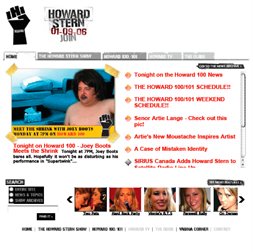
HowardStern.com has an updated look beginning today. Slower flash syncing but a little easier to read. Needs to get rid of the 1-09-06 start date...we know it already!
Click it out: HowardStern.com
posted by Unknown @ Monday, February 13, 2006,
,
![]()
![]()
This Week's Searching
 Superbowl commercials were the top search words last week, according to Google's Zeigeist Index. Makes sense. I bet you did a little Super Bowl ad searching online for yourself...or, at least someone emailed you the links and made it easier for you.
Superbowl commercials were the top search words last week, according to Google's Zeigeist Index. Makes sense. I bet you did a little Super Bowl ad searching online for yourself...or, at least someone emailed you the links and made it easier for you.
Super Bowl ads cost $2.5 million for a 30 second spot. That cost isn't really for just for the ad time. It's to generate buzz so people can watch online and pass it along to friends. Advertisers aim to entertain and connect the products with customers. Having customers distribute the ads for free is exactly what they want. THAT is modern viral buzz marketing.
And to post them onto blogs (Burger King, you can thank us with a Whopper coupon).
Oh, to view the ads, click here.
Or go here on aol.
For GoDaddy.com's ad (plus a look at all the "rejects"), click here
This week's top searches probably will be Olympics-oriented. We'll post them once you finish your searches.
Last week's other top searches:
2. Coretta Scott King
3. Groundhog Day (here on the East Coast, definitely more winter)
4. Superbowl
5. Mohammed Cartoon (since mainstream media won't publish it)
6. Jodie Sweetin (American Idol tryouts)
7. Oscar nominations
8. Heather Locklear (I still remember that poster on my dorm-room wall; Heather, call me...)
9. ufc
10. When A Stranger Calls (use the caller ID!)
11. Rolling Stones
12. Timothy Treadwell
13. State of the Union
14. Steelers
15. Nikki Cox (I still remember that poster on....)
Source: The Zeitgeist
posted by Unknown @ Monday, February 13, 2006,
,
![]()
![]()
Gadgets: Pushing Closer to "SkyNet" Integration?
 Arnold Schwarzenegger just may be more of an visionary than you think. Well, maybe it's really James Cameron's view of the future world. When you look around, it's starting to happen. It's all "wired". Products that never had high-tech now does. It's all getting more and more interfaced, plugged-in, and inter-connected. That's good on some levels...but who's minding the real "control" store?
Arnold Schwarzenegger just may be more of an visionary than you think. Well, maybe it's really James Cameron's view of the future world. When you look around, it's starting to happen. It's all "wired". Products that never had high-tech now does. It's all getting more and more interfaced, plugged-in, and inter-connected. That's good on some levels...but who's minding the real "control" store?
I was just reading through this weekend's USA Today and I saw this article on gadgets and everyday things getting fully connected, adding to consumer-level needs for convenience. Fully connected. The question is: to what?
Gas pumps letting customers order coffee, download MP3s or check traffic without ever leaving the pump.
Backyard telescopes loaded with global position satellite (GPS) technology so it can point out which stars you're viewing. Parking meters with a chip and antenna to call your cellphone so you can buy more time.
Touch-screen sewing machines that can download images to embroider. Shipping crates that call their owners for help if they're lost.
A lot of technology companies focus on making computers more powerful and Internet connections faster. But a major trend is pushing in another direction — toward getting cheap computer chips and limited networking capabilities into products that never used to have such technology. It lets companies turn commodity products into premium products that cost more and stand out in the marketplace.
The trend is analogous to the electrification of products 100 years ago, when inventors found ways to use that technology to change everyday items. Hand-turned drills became power drills. Ice boxes became refrigerators. The same thing is happening now, but with computer chips and tiny radio transmitters.
And there's a fascinating twist this time: When you add information and communications to a product, it doesn't just improve that product — it allows that product to become part of a network. Which means those products can talk to other products, or to websites, or to you through your cellphone or PC — creating layer upon layer of new possibilities.
"It opens up innovation to all new things no one ever thought of," says Irving Wladawsky-Berger, in charge of IBM's technical strategy.
It's getting cheaper and cheaper and networks are getting faster and faster, capable of handling more and more of our plugged-in tasks. We ARE moving toward a SkyNet future or Matrix, where the machines are interfaced into everything. Who's minding the store for future homo sapiens?
full story
posted by Unknown @ Sunday, February 12, 2006,
,
![]()
![]()
Fake News Finds Buzz
 It doesn't really matter if you think President Bush is on the ball or out to lunch -- Jon Stewart and the cast of The Daily Show love exposing the lunacy of the right, the left, and everyone in between. (Although, registered Democrats do tend to laugh a little harder.)
It doesn't really matter if you think President Bush is on the ball or out to lunch -- Jon Stewart and the cast of The Daily Show love exposing the lunacy of the right, the left, and everyone in between. (Although, registered Democrats do tend to laugh a little harder.)
With Stewart set to host next month's Oscars, ex-correspondents Steve Carell and Stephen Colbert starring in their own shows, and current costar Rob Corddry signing on for a FOX pilot, there's lots of search buzz on this funny foursome.
According to Yahoo's Buzz Index, men make up 63% of searchers on The Daily Show, while 61% of queries on Jon Stewart come from smitten females. Apparently dudes dig the show, but ladies dig the man. Jon, you're a dog. A very handsome one.
The buzz on straight-faced, strait-laced, not-a-hair-out-of-place Stephen Colbert is up 9% this week. However, interest in his show, The Colbert Report, is off nearly 20% in search. As a wise man once said, truthiness, however truthful, hurts.
Daily Show alum Steve Carell is most popular among 25- to 29-year-olds. Nearly 30% of searches come from this age group. Not bad for a 40-Year-Old Virgin. Meanwhile, The Office is outperforming analyst expectations, surging 37% this month.
Finally (and we're not mentioning him last just because he's bald), there's Rob Corddry. Since Colbert and Carell have left, Corddry has become The Daily Show's go-to guy for satirical and ridiculous reporting. Searches on ol' Rob are modest right now, but if his new Fox show survives its treacherous infancy, he could be TV's next big thing.
posted by Unknown @ Saturday, February 11, 2006,
,
![]()
![]()
Spyware Threat 21 Times Greater For IE Users
 Microsoft dropped Internet Explorer support for Apple's OS in December. No sweat for MacHeads, since Firefox and Safari are more popular browsers. More secure, from spyware, virus and worm threats, too. It's the PC users that still deal with Microsoft's IE headaches.
Microsoft dropped Internet Explorer support for Apple's OS in December. No sweat for MacHeads, since Firefox and Safari are more popular browsers. More secure, from spyware, virus and worm threats, too. It's the PC users that still deal with Microsoft's IE headaches.
PC users are as much as 21 times more likely to end up with spyware on their computers than those who use Mozilla's Firefox browser, according to a new extensive study. The test sent Web crawlers to scour 45,000 malicious Web sites for executable files that exposed unpatched versions of IE and Firefox to so-called drive-by downloads. When prompted to download a file they'd never requested, the group's IE computer was infected 1.6 percent of the time when responding "yes." Even when the group clicked "no," 0.6 percent of the domains installed the drive-by on the IE computer anyway.
By contrast, 0.9 percent of the domains infected the Firefox browser when the group input "yes," while none of the domains infected it when the group input "no." While these numbers may not seem like much, the professors said one must consider the billions and billions of Web pages out there.
With IE, most of the exploits were based on ActiveX and JavaScript vulnerabilities--two technologies that have long taken the blame for many IE problems. Firefox does not support ActiveX; many of its supporters believe that to be a big reason why Firefox is considered to be a more secure browser.
Here at the Jointblog, we use Firefox for the design and for all coding and post upload editing. Take a recommendation: Stop using Internet Explorer, unless you like getting your computer sick.
TechWeb News article
posted by Unknown @ Friday, February 10, 2006,
,
![]()
![]()
Sirius Had Howard, XM Now Has Oprah: Battle of Media Titans in Space
 For 15 months, Howard Stern became the biggest figurehead encouraging radio listeners to give up "free" radio and sign up for satellite radio. Obviously, he promoted his future (and now) home: Sirius Radio.
For 15 months, Howard Stern became the biggest figurehead encouraging radio listeners to give up "free" radio and sign up for satellite radio. Obviously, he promoted his future (and now) home: Sirius Radio.
While the media went ga-ga staying on the Howard Watch beat, XM just stuck to their knitting and quietly kept their growth pace of new subscibers. Plus they created some excellent TV ads featuring key stars (Ellen, Bowie, Snoop, etc.) and even had an episode on "The Apprentice" during Novemeber sweeps.
With a month of Howard on Sirius, XM Radio has brought out the big guns: Oprah. If Stern is the King of All Media, Oprah is surely the Supreme Queen of All Things Important (acronym: SQATI).
Howard's pre-broadcast run pushed new Sirius subscribers to just over 3 million. Meanwhile, XM maintained their advantage and grew to just over 6.5 million subscribers. Imagine what the Power of O could do for XM.
Oprah Winfrey signed a three-year, $55 million deal with XM Radio and will launch her new channel -- "Oprah & Friends" -- in September. It will air programming on fitness, health and self-improvement topics with personalities that appear on Winfrey's TV program, "The Oprah Winfrey Show," as well as in O, The Oprah Magazine. It will also feature a weekly radio show with Winfrey and Gayle King.
Her $55 million, 3-year contract is not in the same league as Stern's $500 million, 5-year contract or even XM's $650 million, 11-year contract with Major League Baseball.
Which do you think will have the most impact, though?
full article, click here
posted by Unknown @ Thursday, February 09, 2006,
,
![]()
![]()
U2 Wins Grammy Award for Album of the Year
 (from AP) Rock and Roll Hall of Fame members U2 captured the Grammy Award for album of the year for the disc "How to Dismantle an Atomic Bomb."
(from AP) Rock and Roll Hall of Fame members U2 captured the Grammy Award for album of the year for the disc "How to Dismantle an Atomic Bomb."
It was the band's second major award of the night, having won song of the year for "Sometimes You Can't Make It on Your Own," one of the album's songs.
"This is really a big, big night for our band," Bono said.
U2 beat out Mariah Carey's best-selling "The Emancipation of Mimi," shutting out the songbird from any of the major Grammy Awards in her comeback year. Other nominees included Paul McCartney's "Chaos and Creation in the Backyard," Gwen Stefani's "Love. Angel. Music. Baby.," and Kanye West's "Late Registration."
Complete list of 2006 Grammy Award winners, click here
posted by Unknown @ Wednesday, February 08, 2006,
,
![]()
![]()
Classic Internet: A Wayback Trip Down Internet Memory Lane
 With the Internet ever-expanding and constantly moving forward, it's easy to forget how websites have changed or even which ones have disappeared. So, when you do decide to look back into the history of the World Wide Web, there is a place to go to revisit "old" (or, if you prefer, "Classic" or "Retro") websites.
With the Internet ever-expanding and constantly moving forward, it's easy to forget how websites have changed or even which ones have disappeared. So, when you do decide to look back into the history of the World Wide Web, there is a place to go to revisit "old" (or, if you prefer, "Classic" or "Retro") websites.
It's called the Internet Archive's Wayback Machine and it's actually a pretty cool thing to check out. Take a look for yourself at the yearly changes of Yahoo!, eBay, Amazon and many, many others. It might help you understand how certain sites became successful and why others failed. Often, the design and ease of the site explains the entire story.
The Internet Archive's Wayback Machine now has 55 billion archived web pages -- the largest one-stop permanent web archive out there, going back to 1996.
posted by Unknown @ Wednesday, February 08, 2006,
,
![]()
![]()
"I Just Can't Quit You": Spoofing Brokeback Mountain
 "I just can't quit you" is this year's "You had me at hello" catch-phrase.
"I just can't quit you" is this year's "You had me at hello" catch-phrase.
With the Internet, spoof videos are available near-instantly around the world. And there are some great ones for "Brokeback Mountain".
Late night comedians (and water cooler comedians) are making it their daily mission to deliver the newest funny (David Letterman sampler: "Top 10 Signs You Are a Gay Cowboy -- #1 reason: You love riding, but you don't have a horse.").
Even if it doesn't win a raft of Academy Awards (although they sure look like favorites with 8 nominations and a heavy ad campaign), Brokeback Mountain is already spawning some of the best Internet spoofs in recent movie memory.
You can find dozens of takeoffs on the gay cowboy romance, from the homemade BrokeMac Mountain to Brokeback to the Future, a trailer so professionally and cleverly done that Hollywood could take a cue on how to do an effective coming attraction. And it doesn't give away the ending like most promos now genderally do!
To view BrokeBack To The Future (hilarious!) on YouTube.com, click here.
To view BrokeMac Mountain, click here.
Top Gun receives a Brokeback makeover as Tom Cruise gazes longingly at his wing man in Brokeback Squadron (click here).
Nashville comics Travis and Jonathan do their good ol' boy version of SCTV's Bob and Doug McKenzie while reviewing Brokeback Mountain (click here)
posted by Unknown @ Wednesday, February 08, 2006,
,
![]()
![]()
Major Investors Want Time Warner To Split in Four
 Big Media is not Best Media for Time Warner -- the world's largest media company and a major pacesetter for media and ecomonic trends, according to an investor group headed by Carl Icahn. Unveiling its long-awaited report on a plan to restructure Time Warner, it recommends a strategy that would split the media giant into four separate publicly traded companies: America Online Inc., Time Warner Cable, the Warner Bros. movie studio and cable networks and its publishing businesses.
Big Media is not Best Media for Time Warner -- the world's largest media company and a major pacesetter for media and ecomonic trends, according to an investor group headed by Carl Icahn. Unveiling its long-awaited report on a plan to restructure Time Warner, it recommends a strategy that would split the media giant into four separate publicly traded companies: America Online Inc., Time Warner Cable, the Warner Bros. movie studio and cable networks and its publishing businesses.
Another death blow to that false religion preached by Wall Street in the Go Go '90s that bigger is better and synergy would lead to the promised profit (note: not prophet) land. This report -- following the recent corporate splits of Viacom and others -- exposes the truth of what the post-Telecom Bill of 1996 really was: a land grab which increased property values and placed consumer demands clearly in a secondary role.
With the new call from government and independent think tanks for renewed investment in innovation, research and global competitiveness, we just may be on a new trend. Consumer satisfaction may just come back in vogue. And we'll have the marketplace to thank.
According to the report, Time Warner has lost about $40 billion in shareholder value since 2002, and its shares have underperformed the major stock indexes by about 40%.
They say Time Warner senior management has run the company for the short term, missing out on key acquisitions while mismanaging one of its biggest assets, AOL. To be fair, Time Warner was simply doing what other Big Media companies were doing -- trying to figure out what in the world to do with all their newly-acquired/merged assets in a rapidly-evolving Media World while pressured by Wall Street to perform now.
If Time Warner follows the spin-off advise of its biggest investors, it would send out positive ripples across the economy. Now that would be innovative.
Read the full article here.
posted by Unknown @ Wednesday, February 08, 2006,
,
![]()
![]()
Billboard Radio Monitor Roundtable: Radio Vs. The iPod
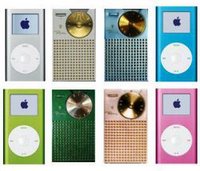 A couple of weeks ago, Billboard's Radio Magazine invited several leaders from the radio industry to talk about the current state of the radio industry and how radio can better compete against new media/digital threats. iPods, how to target today's youth market, new technologies radio should embrace and other opportunities and threats were all discussed.
A couple of weeks ago, Billboard's Radio Magazine invited several leaders from the radio industry to talk about the current state of the radio industry and how radio can better compete against new media/digital threats. iPods, how to target today's youth market, new technologies radio should embrace and other opportunities and threats were all discussed.
The conclusions: Technology may not be the enemy. A challenger at times, certainly, but not the competitive antagonist that many inside and outside the radio industry have made it out to be.
In fact, with high-definition side channels, podcasting and re-energized radio station Web sites, technology has become a requisite collaborator in terrestrial radio's ongoing battle for increased market share, brand extension and revenue building.
While iPods, Internet music destinations and satellite radio present a threat to broadcasters' quest for consumers' time, the medium's own arsenal of technology-driven tools will lead its charge into the future. Joint Communications Corporation's CEO John Parikhal was among the seven industry leaders who gathered Jan. 19 at Billboard Radio Monitor's headquarters in New York, along with executives from Clear Channel, BigChampagne, Greater Media, Edison Media Research, CBS Radio's news WINS New York and Emmis' R&B/hip-hop WQHT (Hot 97) New York.
Joint Communications Corporation's CEO John Parikhal was among the seven industry leaders who gathered Jan. 19 at Billboard Radio Monitor's headquarters in New York, along with executives from Clear Channel, BigChampagne, Greater Media, Edison Media Research, CBS Radio's news WINS New York and Emmis' R&B/hip-hop WQHT (Hot 97) New York.
UPDATE: Now you can download or view the streaming video of the discussion by clicking here.
Among the quotable highlights:"Radio has been attacked from a lot of sides, but it's held up to videogames, satellite radio and iPods," said Buzz Knight, VP of content development for Greater Media. "There are significant challenges ahead, but there's room for optimism. It's a very exciting time."
Tom Poleman, senior VP of programming for Clear Channel/New York, added, "We have an opportunity to reach consumers in new and different ways with the technologies that are out there." With HD side channels, podcasting and on-demand video platforms, "this is an exciting time for radio. We need to ride the wave."
"You don't try to educate listeners; another kid does," said John Parikhal, CEO of Joint Communications. "No matter how much we want people to pay attention to us, a filter goes up. They're spending 70 hours a week with media in an overcommunicated world. If the product is good, they'll eventually pay attention to it."
WINS VP/GM Greg Janoff added, It's about building community and getting listeners to tell their friends about it. Radio is not dead; it just has to reinvent itself. We're the original community builders."
More from John Parikhal: "Radio has never really invented anything—it does a brilliant job of packaging what's already out there. What the industry needs to do is accelerate the rate at which talent gets to radio. Spend the time to train people who want to bring stuff to the medium. Take everything we know about formatting and packaging and teach it to people who want to be on the air, through podcasts. Use formal training methods, and you'll find talented people who could be really good if only they knew how to do radio."
Joe Fleischer, principal of BigChampagne, which tracks traffic on illegal file-sharing platforms, added, "The music industry now realizes that they're not in the business of selling plastic discs anymore. They're now selling content. Unfortunately, they missed the biggest transition since vinyl to CD by three years. Now it's up to them to figure out how to work with everyone that needs content."
One more from John Parikhal: "One of radio's great strengths is repetition. There's nothing worse for a listener than a song that he or she doesn't recognize. It's a balancing act between comfort and introducing new music. The problem for radio today is that young listeners are getting their new music from friends via" instant messaging.
To read the rest of the article, click here
posted by Unknown @ Monday, February 06, 2006,
,
![]()
![]()
Super Sunday Ratings
 ABC’s broadcast of the Super Bowl XL drew a bigger audience than last year, despite early estimates that the game would come in below last year's broadcast on
ABC’s broadcast of the Super Bowl XL drew a bigger audience than last year, despite early estimates that the game would come in below last year's broadcast on
According to an ABC spokesman, quoting Nielsen Media Research Fast National numbers, the game drew an average of 90.72 million viewers, compared with the previous year’s broadcast on Fox that pulled in 86.1 million viewers. Super Bowl XL drew a household rating of 41.6 and a 62 share, and in the 18-49 demographic drew a 34.6 rating. (A rating is a percentage of households watching a broadcast.)
In local markets, the game drew a 57.1 rating in Pittsburgh, home of the winning team, the Pittsburgh Steelers. In the Seattle market, home of the losing Seattle Steelers, the game scored a 55 rating while viewers in Detroit, the host city, pushed the game to a 52.3 rating.
ABC is also touting the huge ratings success of the network’s post-game entertainment. Hospital drama “Grey’s Anatomy” reached 38.1 million households. That figure is the largest audience for post-game entertainment since "Survivor 2" broadcast on CBS in 2001.
Last year’s matchup between the New England Patriots and the Philadelphia Eagles drew 86.1 million viewers, according to Nielsen Media Research, for a 41.1 household rating for Fox. That figure was down from 2004, when 89.8 million viewers, or 41.4% of U.S. households, tuned in to see the Patriots and the Carolina Panthers on CBS. The now infamous telecast featured the Janet Jackson halftime show wardrobe malfunction.
According to A.C. Nielsen, the most-watched Super Bowl in the past 10 years was the 1996 contest between the Steelers contest the Dallas Cowboys (the Steelers lost that game). That game drew 94.1 million viewers, for a 46 rating. The 1982 Super Bowl was the most-watched of all time, with a rating of 49.1.
Source: AdAge; Nielsen Media Research data
posted by Unknown @ Monday, February 06, 2006,
,
![]()
![]()
Super Bowl XL Commercials
 Super Bowl XL turned out to be a good competitive game but the commercials were a little mild. No surprise there, after the perky "titillation" of Nipplegate and GoDaddy.com these last 2 years.
Super Bowl XL turned out to be a good competitive game but the commercials were a little mild. No surprise there, after the perky "titillation" of Nipplegate and GoDaddy.com these last 2 years.
I'm just happy the limp erectile dysfunction ads were kept off...now that is keeping it real.
A record $2.5 million (or $83,333 a second) — up from $2.4 million last year — was spent per 30-second commercial spot.
After 15 edits, GoDaddy.com's ad was finally accepted...and still managed to break a spagetti strap. A much tamer "wardrobe malfunction".
Nationwide, Sprint and Bud Light probably were among the best...athough Pepsi with Diddy and the return of the Burger King King with the Whopperettes may have been among the top picks.
If you missed some of this year's Super Bowl ads or you just want to see them again, visit IFILM for free streaming and/or downloads. You'll be able to grab your favorite ads and paste them right into your own blog or web page. Previous Super Bowl commercials are also available.
To view the ads, click here.
Or go here on aol.
For GoDaddy.com's ad (plus a look at all the "rejects", click here
posted by Unknown @ Monday, February 06, 2006,
,
![]()
![]()
Executives, Interrupted
Labels: email, executives, management, Time On a typical workday, more than 75 percent of senior executives and managers have an hour or less of uninterrupted time, and more than 25 percent have less than a half-hour, according to a new nationwide survey conducted by NFI Research. Of the individuals surveyed, two-thirds said that they are distracted 11 to 40 times a day, while a third said their interruptions number 21 or more.
On a typical workday, more than 75 percent of senior executives and managers have an hour or less of uninterrupted time, and more than 25 percent have less than a half-hour, according to a new nationwide survey conducted by NFI Research. Of the individuals surveyed, two-thirds said that they are distracted 11 to 40 times a day, while a third said their interruptions number 21 or more.
Sounds like a typical stay-at-home parent with a young child (or two or three...)
Writing about the survey results on Darwinmag.com, syndicated columnist and author Chuck Martin reports that, while interruptions take on various forms (phone calls, questions from subordinates, pages, etc.), e-mail was the form most cited in write-in comments.
Click here to read the complete article.
posted by Unknown @ Sunday, February 05, 2006,
,
![]()
![]()















